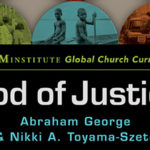Christians cannot expect to help people get right with God without helping them restore their relationships to others, Jon Singletary stressed in the inaugural lecture in Buckner International’s new missions series.
“We cannot expect someone to thrive in her or his relationships without the presence of God. At the same time, we cannot expect someone to thrive in a relationship with God when the other systems in their lives are not working in a meaningful and effective way,” said Singletary, dean of the Diana R. Garland School of Social Work at Baylor University.
“The goal of being on mission with God is not to do things, to make things or to fix things,” Singletary said. “It is to pursue a process of holistic reconciliation alongside people who are poor, in light of our brokenness and the broken systems we benefit from, so that we are all better equipped for right relationships with each other and with God.”
For example, congregations and missionaries often seek to address a person’s relationship with God, but that relationship cannot be made whole if the person’s other relationships are not whole, he explained.
If a person has no sense of purpose, no connection to community, or ineffective social, political or economic systems, then wholeness is not possible, Singletary said. So, a relationship with God depends upon these other relationships.
Christians can practice appreciative inquiry, a model for understanding the strengths and supportive assets of a community or culture, in order to build relationships with people they hope to serve, he noted.
This approach considers what can be learned from how God already is working in people’s lives, he said. It builds upon what already is right and good in order to help them achieve a more positive future.
Questions to be asked include: How do we assume the best in others? How can we practice empathy? How do we nurture what is working? How do we promote big dreams? How do we ask big questions and practice a commitment to listen?
This approach and these questions can help congregations that want to understand their own mission, strengthen their ministries and learn from ministry partners in the United States and overseas, noted Javier Perez, director of missions and poverty alleviation for Buckner International.
Sign up for our weekly edition and get all our headlines in your inbox on Thursdays
The new Buckner Missions Lecture Series is “creating a space for thought-provoking, spiritually challenging and action-oriented dialogue between the missiological community and subject-matter experts,” said Diego Silva, leader of the Buckner domestic missions team. “We are seeking to explore, together, what the kingdom of God really looks like.”
Based on reporting by Nikki Wilmoth, Baylor University.














We seek to connect God’s story and God’s people around the world. To learn more about God’s story, click here.
Send comments and feedback to Eric Black, our editor. For comments to be published, please specify “letter to the editor.” Maximum length for publication is 300 words.